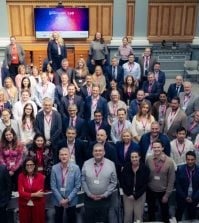UK civil servants told to exercise caution around AI chatbot use

The UK Department for Science, Information and Technology (DSIT) has advised civil servants thinking about using artificial intelligence chatbots to automate tasks to weigh up the risks and benefits.
The i newspaper revealed last week that DSIT had been asked by multiple departments to clarify whether AI chatbots like ChatGPT could be used to automate tasks such as email and letter writing and repetitive work in policymaking.
It is understood that DSIT has not explicitly discouraged the use of chatbots by officials but has suggested that departments be aware both of their potential for making government work easier and the associated pitfalls.
The requests for clarification follow a steep rise in the popularity of services such as ChatGPT and others launched by tech firms including Google and Bing. Developed by Silicon Valley-based AI research and deployment firm OpenAI, ChatGPT was launched in November last year and has since drawn global media attention and controversy for its sophisticated responses to user demands and questions. It has gained 100 million users in just two months.
DSIT’s advice has been praised by Gavin Freeguard, an associate at London-based think tank the Institute for Government, who said that the department appeared to have struck a sensible balance between optimism and scepticism around the use of chatbots in state administration.
“Governments should always be thinking about how new technology can support their operations and ultimately benefit citizens, but it’s vital that they don’t get swept away by the hype – adopting new technologies in haste and repenting at leisure,” he said.
The government was approached by i but said they would not comment on leaks.
Read more: Biden sets out AI Bill of Rights to protect citizens from threats from automated systems
‘An epoch-defining development’
In the same week that DSIT’s advice came to light, the Tony Blair Institute for Global Change published a report entitled ‘A New National Purpose: Innovation Can Power the Future of Britain‘. In it, the former Labour leader and UK prime minister Tony Blair and his one-time rival for No.10 Downing Street, Conservative party politician William Hague wrote that AI was “finally living up to decades of ambition to collectively become an epoch-defining development”.
Blair and Hague pushed for what they described as “government-led development of sovereign general-purpose AI systems, enabled by the required supercomputing capabilities, to underpin broad swaths of public-service delivery”.
They also called for a number of changes to help government deliver in the “AI era”. These include a national health infrastructure that used “interoperable data platforms” to reduce costs and improve operational efficiencies, as well as secure, privacy-orientated digital ID for citizens to enjoy better interactions with government.
Governments around the world are increasingly using AI and machine learning tools in a variety of areas, from monitoring the large volumes of money that move through financial systems so as to keep tabs on fraud, sanctions and money laundering, to assessing national security risks and solar energy supply.
The Indian government announced in 2021 that it was seeking tech firms to build an AI-powered chatbot to help citizens access digital services, while The Indian Railway Catering and Tourism Corporation, a government-run organisation, uses an AI virtual assistant known as ‘Ask Disha’ to field a wide variety of questions from users of its online railway ticketing system in Hindi and English.
In January this year, UK chancellor Jeremy Hunt revealed to parliament that he had used ChatGPT to compose the opening lines of a speech on the economy.
“From the way we communicate and collaborate, to the way we buy and sell goods and services, digital technology has transformed nearly every aspect of our economic lives,” Hunt said. “How do I know that? Because I… asked ChatGPT to craft the opening lines of this speech. Who needs politicians when you have AI?”
Read more: AI in the public sector: an engine for innovation in government
Want to write for GGF? We are always looking to hear from public and civil servants on the latest developments in their organisation – please get in touch below or email [email protected]





















